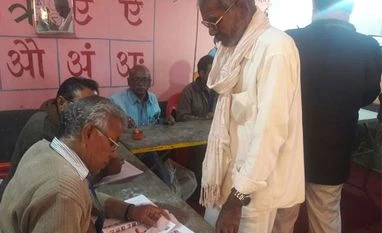Results of the by-elections to fill casual vacancies in the Lok Sabha from Parliamentary constituencies of Assam, West Bengaland Madhya Pradesh, and Assembly seats in Assam, Arunachal Pradesh, Madhya Pradesh, Puducherry, Tamil Nadu and Tripura were out on November 22, three days after polling.
The government announced demonetisation on November 8. Elections were held on November 19. So, voters had plenty of time to factor in the inconvenience caused by demonetisation, absorb the arguments offered for and against the move and give their verdict.
The only common strand in the electoral exercise, it turned out, was that demonetisation left the electorate neither shaken nor stirred. Voting was along the predictable lines. Where the party in power (at the Centre or in states) had held the seats, it kept those seats. Despite the cataclysm of demonetisation it had absolutely no effect on voting.
For instance, Lakhimpur, the Lok Sabha seat in Assam was vacated by Chief Minister Sarbananda Sonowal. It would have been entirely appropriate for voters from Lakhimpur to teach the central government a lesson via the election and voted against the government – both Union and state.
It didn’t. The BJP has kept Lakhimpur.
Similarly, while Congress fielded Himadri Singh, daughter of former Union Minister Dalbir Singh and ex-MP Rajesh Nandini Singh, from Shahdol Lok Sabha seat, the Bharatiya Janata Party set up senior minister in Shivraj Singh Chouhan’s cabinet and tribal leader Gyan Singh from the reserved seat. The BJP has won both the seats.
If people were so appreciative of the BJP’s demonetisation move, they should have rewarded it by voting it to power in West Bengal. But that did not happen. Nor were they impressed by the Congress’s fight against the move. The Congress candidates for the Coochbehar and Tamluk Lok Sabha bypolls in West Bengal lost by a big margin. Partha Pratim Isore from the Coochbehar (SC) Parliamentary constituency and Partha Batabyal from Tamluk lost both the seats to Trinamool Congress.
More From This Section
Even more interesting is the result of the assembly by-elections. Aravakurichi, Thanjavur and Tiruparankundram (Tamil Nadu) were voting not just for or against demonetisation. They were also voting in a state where ailing All India Anna Dravida Munnetra Kazhagam (AIADMK) chief Jayalalithaa and Dravida Munnetra Kazhagam (DMK)’s new chief Stalin were testing their spurs by proxy. For both it was a prestige election: Jayalalithaa had to prove that she could win elections from her hospital bed, while for Stalin it was the first election since he was named heir to the party by his father. The Congress did not contest the elections.
All three seats were won by the AIADMK with DMK coming second and BJP third. A full analysis of voteshare (once the data is available) will tell us the story in depth. Nellithope (Puducherry), Baithalangso (Assam), Hayuliang (Arunachal), Nepanagar (Madhya Pradesh), Barjala (Tripura) and Khowai (Tripura) also saw a similar result along predictable lines. So no referendum on demonetisation – not this election!
)